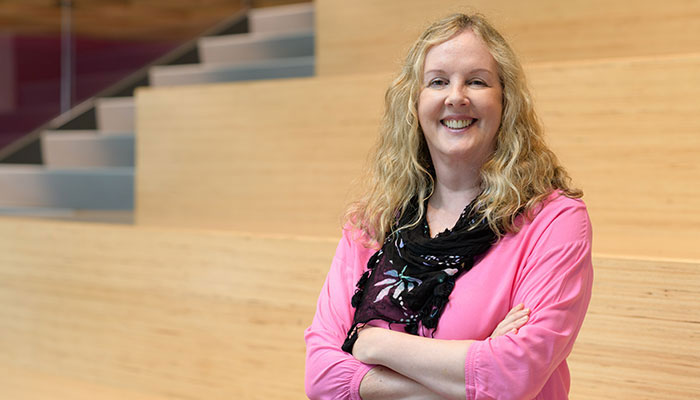Menopause is a natural developmental process lasting, on average, for seven years.

Business case: With more than 1.6 million Australian women employed while they experience menopausal symptoms, researchers say the need for more support in the workplace is clear.
Menopausal symptoms usually begin when women are in their mid-forties. Symptoms include insomnia, anxiety, difficulties concentrating and memory difficulties. Symptoms can also include joint pain as well as feelings of disconnection and loss of confidence.
Over 70 per cent of women are employed at the time they transition through natural menopause equating to more than 1.6 million Australian women. Unfortunately, menopause is still often seen as a personal issue and one of the last remaining workplace taboos. However we argue the business case for paying more attention to menopause is clear.
Menopause is associated with increased turnover, reduced time in employment, increased absenteeism and decreased career advancement.
A 2021 UK study of 2400 menopausal financial services workers found 47 per cent were less likely to apply for a promotion because of their menopausal experiences, whilst another 2021 UK study of 3108 menopausal workers found 11 per cent reported exiting work prematurely and 23 per cent reduced their working hours directly due to their menopause experiences.
When women leave work or remain in more junior roles or move to part-time work, organisations face a significant loss of expertise and experience.
There is a relative dearth of Australian research on the work-related impact of menopause, however a 2014 Australian study reported that menopause was strongly associated with reduced work engagement and a high turnover intention. Indeed, while a greater proportion of men move into leadership positions as they age, the proportion of women who occupy leadership roles increases between18 and 44 years and then significantly decreases.
The financial impact for women who prematurely leave work or move to part-time work is significant. In 2022, Australia's superannuation peak body, the Australian Institute of Superannuation Trustees, estimated menopause costs female workers more than $17 billion each year in lost earnings and superannuation. It called on the Federal Government to address the impact of menopause on women's employment.
When women leave work or remain in more junior roles or move to part-time work, organisations face a significant loss of expertise and experience.

High impact: Data shows menopause is associated with increased turnover, reduced time in employment, increased absenteeism and decreased career advancement.
Given most women will experience menopause between the age of 45 and 54 years, supporting menopausal women to remain at work will increase the number of women in senior and leadership positions, contributing to gender equity in senior roles. This is important as firms with higher proportions of female leaders significantly outperform against industry benchmarks, particularly when women are in senior roles.
Further, the cost of hiring and training senior employees is double the cost of their annual salary, accompanied by reduced productivity. An estimated 10 per cent of women leave work prematurely due to the effects of menopause - the estimated turnover cost to Australian organisations is more than $10 billion annually.
What can employers do?
Recent recommendations regarding employer actions to support menopausal women highlight the benefits of workplace adjustments as well as building an inclusive climate.
In particular, tackling the stigma associated with menopause is central to improving working conditions, which is a substantial challenge for managers given the taboo associated with menopause. This means many women do not even disclose their menopausal issues at work.
However, there is relatively brief training available that helps managers overcome the menopausal taboo and widespread inaccurate beliefs to develop shared solutions with their menopausal employees and colleagues.

Solutions: Professor Rebecca Mitchell is part of a new international group of business and psychology researchers who aim to find ways to support working women through menopause.
In addition, initial research into support interventions (such as online communities) suggests significant potential to increase menopausal women's wellbeing and self-confidence. These types of interventions are important as they typically work to lessen the impact of widely held stigma regarding menopause, which can lead to embarrassment and even shame in menopausal women.
Programs that uncover and challenge inaccurate negative menopausal beliefs can also improve women's wellbeing and increase job satisfaction. Interventions that support women to reflect on their own needs and advocate for workplace changes that help to resolve their specific challenges are also effective, particularly as there is substantial variation in women's experience of menopause.
However, there remains comparatively little research on menopause and work which limits the guidance that is available for employers. Addressing this gap is a recognised priority for researchers from a wide range of health and business disciplines .
An active group of researchers at Macquarie University from the Business School and psychological science is leading this effort and has just launched an international research collective, MenoNet, to bring together menopausal researchers to find solutions that will support women to work effectively through menopause and beyond.
Rebecca Mitchell is a Professor of Management in the Macquarie Business School. Her current research project is on wellbeing and resilience at work.
Jun Gu is an Associate Professor in the Department of Management in the Macquarie Business School and works in leadership and wellbeing.
Kerry Sherman is a Professor in the School of Psychological Sciences, working in occupational health psychology.






